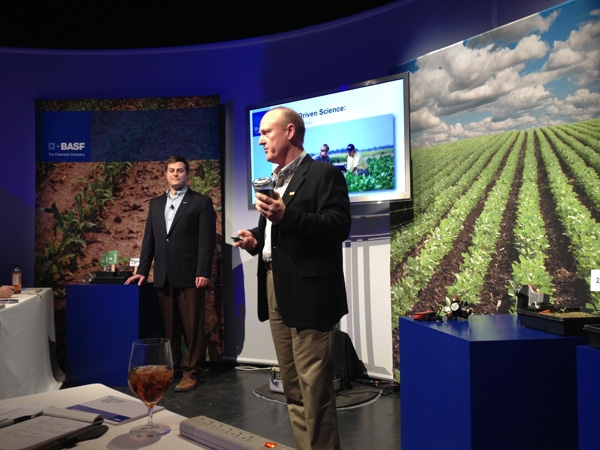March 5, 2013

On location at Universal Olando’s World of Harry Potter, BASF last week lifted up the curtains to new science the company is working on to control weeds in crops and promote plant health.
“We have a lot of new stuff going on at BASF with regard to research development and new products, so what we thought we’d do here today is to show a smattering of products across the crop spectrum,” says BASF communications manager Pat Morrow at the company’s "Science Behind" crop protection symposium.
Paul Rea, vice president of crop protection for BASF who led the discussion, says the company funds more than $2 million per day in research to make up what he sees as the lack in public spending on agricultural research. He says the research will be needed to meet the world demand for food, which is expected to double by 2050.
One new product highlighted at the event was Engenia, a dicamba herbicide for dicamba-tolerent soybeans that is currently undergoing field testing. BASF says the new herbicide will deliver broad-spectrum burndown of more than 100 annual broadleaf weeds, as well as offer low volatility to reduce spray drift.
Within the plant health arena, technical market specialist Jennifer Holland talked about research the company is doing on photosynthesis and the products being developed to increase it so that crops can produce more grain. Those products include Headline AMP fungicide for corn, Priaxor fungicide for soybeans and Twinline fungicide for cereals.
To cap off the event, crop yield contest winners Kip Cullers, Purdy, Mo., and Randy Dowdy, Brooks County, Ga., talked about the products, including some made by BASF, and pest management strategies they used to grow high-yield crops. Cullers, who has used Headline fungicide for years, broke his own soybean yield world record in 2010 with a 160.0 bu./acre yield. Dowdy had the second highest corn yield in the country in 2012 with 372.33 bu./acre.
“It doesn’t matter how the season is progressing, every year we start the season with the decision that we will stay ahead of weeds, disease and insect pests,” Cullers said. “By planning ahead, we are able to take control of pests before they negatively affect our crop, helping us maximize yield and ROI.”
AJ Woodyard, technical crop production specialist, BASF, shared newly released results from three years of crop protection research trials that showed an average 6.0-bu./acre increase in soybeans and 18.2-bu./acre increase in corn with the use of a comprehensive pesticide approach compared to a non-residual, glyphosate-based program.
For more information on BASF Crop Protection products, visit http://agproducts.basf.us.
About the Author(s)
You May Also Like




